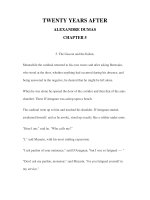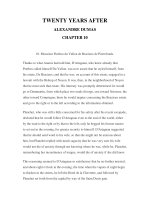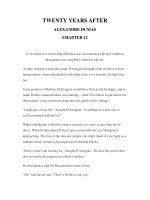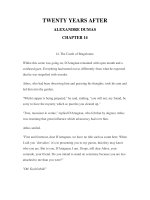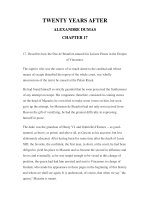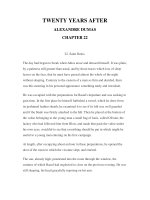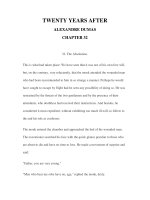LUYỆN ĐỌC TIẾNG ANH QUA CÁC TÁC PHẨM VĂN HỌC –TWENTY YEARS AFTER ALEXANDRE DUMAS CHAPTER 58 pptx
Bạn đang xem bản rút gọn của tài liệu. Xem và tải ngay bản đầy đủ của tài liệu tại đây (123.49 KB, 29 trang )
TWENTY YEARS AFTER
ALEXANDRE DUMAS
CHAPTER 58
58. Jesus Seigneur.
Whilst Mordaunt was making his way to Cromwell's tent, D'Artagnan and
Porthos had brought their prisoners to the house which had been assigned to
them as their dwelling at Newcastle.
The order given by Mordaunt to the sergeant had been heard by D'Artagnan,
who accordingly, by an expressive glance, warned Athos and Aramis to exercise
extreme caution. The prisoners, therefore, had remained silent as they marched
along in company with their conquerors which they could do with the less
difficulty since each of them had occupation enough in answering his own
thoughts.
It would be impossible to describe Musqueton's astonishment when from the
threshold of the door he saw the four friends approaching, followed by a
sergeant with a dozen men. He rubbed his eyes, doubting if he really saw before
him Athos and Aramis; and forced at last to yield to evidence, he was on the
point of breaking forth in exclamations when he encountered a glance from the
eyes of Porthos, the repressive force of which he was not inclined to dispute.
Musqueton remained glued to the door, awaiting the explanation of this strange
occurrence. What upset him completely was that the four friends seemed to
have no acquaintance with one another.
The house to which D'Artagnan and Porthos conducted Athos and Aramis was
the one assigned to them by General Cromwell and of which they had taken
possession on the previous evening. It was at the corner of two streets and had
in the rear, bordering on the side street, stables and a sort of garden. The
windows on the ground floor, according to a custom in provincial villages, were
barred, so that they strongly resembled the windows of a prison.
The two friends made the prisoners enter the house first, whilst they stood at the
door, desiring Musqueton to take the four horses to the stable.
"Why don't we go in with them?" asked Porthos.
"We must first see what the sergeant wishes us to do," replied D'Artagnan.
The sergeant and his men took possession of the little garden.
D'Artagnan asked them what they wished and why they had taken that position.
"We have had orders," answered the man, "to help you in taking care of your
prisoners."
There could be no fault to find with this arrangement; on the contrary, it seemed
to be a delicate attention, to be gratefully received; D'Artagnan, therefore,
thanked the man and gave him a crown piece to drink to General Cromwell's
health.
The sergeant answered that Puritans never drank, and put the crown piece in his
pocket.
"Ah!" said Porthos, "what a fearful day, my dear D'Artagnan!"
"What! a fearful day, when to-day we find our friends?"
"Yes; but under what circumstances?"
"'Tis true that our position is an awkward one; but let us go in and see more
clearly what is to be done."
"Things look black enough," replied Porthos; "I understand now why Aramis
advised me to strangle that horrible Mordaunt."
"Silence!" cried the Gascon; "do not utter that name."
"But," argued Porthos, "I speak French and they are all English."
D'Artagnan looked at Porthos with that air of wonder which a cunning man
cannot help feeling at displays of crass stupidity.
But as Porthos on his side could not comprehend his astonishment, he merely
pushed him indoors, saying, "Let us go in."
They found Athos in profound despondency; Aramis looked first at Porthos and
then at D'Artagnan, without speaking, but the latter understood his meaning
look.
"You want to know how we came here? 'Tis easily guessed. Mazarin sent us
with a letter to General Cromwell."
"But how came you to fall into company with Mordaunt, whom I bade you
distrust?" asked Athos.
"And whom I advised you to strangle, Porthos," said Aramis.
"Mazarin again. Cromwell had sent him to Mazarin. Mazarin sent us to
Cromwell. There is a certain fatality in it."
"Yes, you are right, D'Artagnan, a fatality that will separate and ruin us! So, my
dear Aramis, say no more about it and let us prepare to submit to destiny."
"Zounds! on the contrary, let us speak about it; for it was agreed among us, once
for all, that we should always hold together, though engaged on opposing
sides."
"Yes," added Athos, "I now ask you, D'Artagnan, what side you are on? Ah!
behold for what end the wretched Mazarin has made use of you. Do you know
in what crime you are to-day engaged? In the capture of a king, his degradation
and his murder."
"Oh! oh!" cried Porthos, "do you think so?"
"You are exaggerating, Athos; we are not so far gone as that," replied the
lieutenant.
"Good heavens! we are on the very eve of it. I say, why is the king taken
prisoner? Those who wish to respect him as a master would not buy him as a
slave. Do you think it is to replace him on the throne that Cromwell has paid for
him two hundred thousand pounds sterling? They will kill him, you may be sure
of it."
"I don't maintain the contrary," said D'Artagnan. "But what's that to us? I am
here because I am a soldier and have to obey orders I have taken an oath to
obey, and I do obey; but you who have taken no such oath, why are you here
and what cause do you represent?"
"That most sacred in the world," said Athos; "the cause of misfortune, of
religion, royalty. A friend, a wife, a daughter, have done us the honor to call us
to their aid. We have served them to the best of our poor means, and God will
recompense the will, forgive the want of power. You may see matters
differently, D'Artagnan, and think otherwise. I will not attempt to argue with
you, but I blame you."
"Heyday!" cried D'Artagnan, "what matters it to me, after all, if Cromwell,
who's an Englishman, revolts against his king, who is a Scotchman? I am
myself a Frenchman. I have nothing to do with these things why hold me
responsible?"
"Yes," said Porthos.
"Because all gentlemen are brothers, because you are a gentleman, because the
kings of all countries are the first among gentlemen, because the blind populace,
ungrateful and brutal, always takes pleasure in pulling down what is above
them. And you, you, D'Artagnan, a man sprung from the ancient nobility of
France, bearing an honorable name, carrying a good sword, have helped to give
up a king to beersellers, shopkeepers, and wagoners. Ah! D'Artagnan! perhaps
you have done your duty as a soldier, but as a gentleman, I say that you are very
culpable."
D'Artagnan was chewing the stalk of a flower, unable to reply and thoroughly
uncomfortable; for when turned from the eyes of Athos he encountered those of
Aramis.
"And you, Porthos," continued the count, as if in consideration for D'Artagnan's
embarrassment, "you, the best heart, the best friend, the best soldier that I know
you, with a soul that makes you worthy of a birth on the steps of a throne, and
who, sooner or later, must receive your reward from an intelligent king you,
my dear Porthos, you, a gentleman in manners, in tastes and in courage, you are
as culpable as D'Artagnan."
Porthos blushed, but with pleasure rather than with confusion; and yet, bowing
his head, as if humiliated, he said:
"Yes, yes, my dear count, I feel that you are right."
Athos arose.
"Come," he said, stretching out his hand to D'Artagnan, "come, don't be sullen,
my dear son, for I have said all this to you, if not in the tone, at least with the
feelings of a father. It would have been easier to me merely to have thanked you
for preserving my life and not to have uttered a word of all this."
"Doubtless, doubtless, Athos. But here it is: you have sentiments, the devil
knows what, such as every one can't entertain. Who could suppose that a
sensible man could leave his house, France, his ward a charming youth, for
we saw him in the camp to fly to the aid of a rotten, worm-eaten royalty,
which is going to crumble one of these days like an old hovel. The sentiments
you air are certainly fine, so fine that they are superhuman."
"However that may be, D'Artagnan," replied Athos, without falling into the
snare which his Gascon friend had prepared for him by an appeal to his parental
love, "however that may be, you know in the bottom of your heart that it is true;
but I am wrong to dispute with my master. D'Artagnan, I am your prisoner
treat me as such."
"Ah! pardieu!" said D'Artagnan, "you know you will not be my prisoner very
long."
"No," said Aramis, "they will doubtless treat us like the prisoners of the
Philipghauts."
"And how were they treated?" asked D'Artagnan.
"Why," said Aramis, "one-half were hanged and the other half were shot."
"Well, I," said D'Artagnan "I answer that while there remains a drop of blood in
my veins you will be neither hanged nor shot. Sang Diou! let them come on!
Besides do you see that door, Athos?"
"Yes; what then?"
"Well, you can go out by that door whenever you please; for from this moment
you are free as the air."
"I recognize you there, my brave D'Artagnan," replied Athos; "but you are no
longer our masters. That door is guarded, D'Artagnan; you know that."
"Very well, you will force it," said Porthos. "There are only a dozen men at the
most."
"That would be nothing for us four; it is too much for us two. No, divided as we
now are, we must perish. See the fatal example: on the Vendomois road,
D'Artagnan, you so brave, and you, Porthos, so valiant and so strong you
were beaten; to-day Aramis and I are beaten in our turn. Now that never
happened to us when we were four together. Let us die, then, as De Winter has
died; as for me, I will fly only on condition that we all fly together."
"Impossible," said D'Artagnan; "we are under Mazarin's orders."
"I know it and I have nothing more to say; my arguments lead to nothing;
doubtless they are bad, since they have not determined minds so just as yours."
"Besides," said Aramis, "had they taken effect it would be still better not to
compromise two excellent friends like D'Artagnan and Porthos. Be assured,
gentlemen, we shall do you honor in our dying. As for myself, I shall be proud
to face the bullets, or even the rope, in company with you, Athos; for you have
never seemed to me so grand as you are to-day."
D'Artagnan said nothing, but, after having gnawed the flower stalk, he began to
bite his nails. At last:
"Do you imagine," he resumed, "that they mean to kill you? And wherefore
should they do so? What interest have they in your death? Moreover, you are
our prisoners."
"Fool!" cried Aramis; "knowest thou not, then, Mordaunt? I have but exchanged
with him one look, yet that look convinced me that we were doomed."
"The truth is, I'm very sorry that I did not strangle him as you advised me," said
Porthos.
"Eh! I make no account of the harm Mordaunt can do!" cried D'Artagnan. "Cap
de Diou! if he troubles me too much I will crush him, the insect! Do not fly,
then. It is useless; for I swear to you that you are as safe here as you were
twenty years, ago you, Athos, in the Rue Ferou, and you, Aramis, in the Rue
de Vaugirard."
"Stop," cried Athos, extending his hand to one of the grated windows by which
the room was lighted; "you will soon know what to expect, for here he is."
"Who?"
"Mordaunt."
In fact, looking at the place to which Athos pointed, D'Artagnan saw a cavalier
coming toward the house at full gallop.
It was Mordaunt.
D'Artagnan rushed out of the room.
Porthos wanted to follow him.
"Stay," said D'Artagnan, "and do not come till you hear me drum my fingers on
the door."
When Mordaunt arrived opposite the house he saw D'Artagnan on the threshold
and the soldiers lying on the grass here and there, with their arms.
"Halloo!" he cried, "are the prisoners still there?"
"Yes, sir," answered the sergeant, uncovering.
"'Tis well; order four men to conduct them to my lodging."
Four men prepared to do so.
"What is it?" said D'Artagnan, with that jeering manner which our readers have
so often observed in him since they made his acquaintance. "What is the matter,
if you please?"
"Sir," replied Mordaunt, "I have ordered the two prisoners we made this
morning to be conducted to my lodging."
"Wherefore, sir? Excuse curiosity, but I wish to be enlightened on the subject."
"Because these prisoners, sir, are at my disposal and I choose to dispose of them
as I like."
"Allow me allow me, sir," said D'Artagnan, "to observe you are in error. The
prisoners belong to those who take them and not to those who only saw them
taken. You might have taken Lord Winter who, 'tis said, was your uncle
prisoner, but you preferred killing him; 'tis well; we, that is, Monsieur du Vallon
and I, could have killed our prisoners we preferred taking them."
Mordaunt's very lips grew white with rage.
D'Artagnan now saw that affairs were growing worse and he beat the guard's
march upon the door. At the first beat Porthos rushed out and stood on the other
side of the door.
This movement was observed by Mordaunt.
"Sir!" he thus addressed D'Artagnan, "your resistance is useless; these prisoners
have just been given me by my illustrious patron, Oliver Cromwell."
These words struck D'Artagnan like a thunderbolt. The blood mounted to his
temples, his eyes became dim; he saw from what fountainhead the ferocious
hopes of the young man arose, and he put his hand to the hilt of his sword.
As for Porthos, he looked inquiringly at D'Artagnan.
This look of Porthos's made the Gascon regret that he had summoned the brute
force of his friend to aid him in an affair which seemed to require chiefly
cunning.
"Violence," he said to himself, "would spoil all; D'Artagnan, my friend, prove to
this young serpent that thou art not only stronger, but more subtle than he is."
"Ah!" he said, making a low bow, "why did you not begin by saying that,
Monsieur Mordaunt? What! are you sent by General Oliver Cromwell, the most
illustrious captain of the age?"
"I have this instant left him," replied Mordaunt, alighting, in order to give his
horse to a soldier to hold.
"Why did you not say so at once, my dear sir! all England is with Cromwell;
and since you ask for my prisoners, I bend, sir, to your wishes. They are yours;
take them."
Mordaunt, delighted, advanced, Porthos looking at D'Artagnan with open-
mouthed astonishment. Then D'Artagnan trod on his foot and Porthos began to
understand that this was merely acting.
Mordaunt put his foot on the first step of the door and, with his hat in hand,
prepared to pass by the two friends, motioning to the four men to follow him.
"But, pardon," said D'Artagnan, with the most charming smile and putting his
hand on the young man's shoulder, "if the illustrious General Oliver Cromwell
has disposed of our prisoners in your favour, he has, of course, made that act of
donation in writing."
Mordaunt stopped short.
"He has given you some little writing for me the least bit of paper which may
show that you come in his name. Be pleased to give me that scrap of paper so
that I may justify, by a pretext at least, my abandoning my countrymen.
Otherwise, you see, although I am sure that General Oliver Cromwell can intend
them no harm, it would have a bad appearance."
Mordaunt recoiled; he felt the blow and discharged a terrible look at
D'Artagnan, who responded by the most amiable expression that ever graced a
human countenance.
"When I tell you a thing, sir," said Mordaunt, "you insult me by doubting it."
"I!" cried D'Artagnan, "I doubt what you say!" God keep me from it, my dear
Monsieur Mordaunt! On the contrary, I take you to be a worthy and
accomplished gentleman. And then, sir, do you wish me to speak freely to you?"
continued D'Artagnan, with his frank expression.
"Speak out, sir," said Mordaunt.
"Monsieur du Vallon, yonder, is rich and has forty thousand francs yearly, so he
does not care about money. I do not speak for him, but for myself."
"Well, sir? What more?"
"Well I I'm not rich. In Gascony 'tis no dishonor, sir, nobody is rich; and
Henry IV., of glorious memory, who was the king of the Gascons, as His
Majesty Philip IV. is the king of the Spaniards, never had a penny in his
pocket."
"Go on, sir, I see what you wish to get at; and if it is simply what I think that
stops you, I can obviate the difficulty."
"Ah, I knew well," said the Gascon, "that you were a man of talent. Well, here's
the case, here's where the saddle hurts me, as we French say. I am an officer of
fortune, nothing else; I have nothing but what my sword brings me in that is
to say, more blows than banknotes. Now, on taking prisoners, this morning, two
Frenchmen, who seemed to me of high birth in short, two knights of the
Garter I said to myself, my fortune is made. I say two, because in such
circumstances, Monsieur du Vallon, who is rich, always gives me his
prisoners."
Mordaunt, completely deceived by the wordy civility of D'Artagnan, smiled like
a man who understands perfectly the reasons given him, and said:
"I shall have the order signed directly, sir, and with it two thousand pistoles;
meanwhile, let me take these men away."
"No," replied D'Artagnan; "what signifies a delay of half an hour? I am a man of
order, sir; let us do things in order."
"Nevertheless," replied Mordaunt, "I could compel you; I command here."
"Ah, sir!" said D'Artagnan, "I see that although we have had the honor of
traveling in your company you do not know us. We are gentlemen; we are, both
of us, able to kill you and your eight men we two only. For Heaven's sake
don't be obstinate, for when others are obstinate I am obstinate likewise, and
then I become ferocious and headstrong, and there's my friend, who is even
more headstrong and ferocious than myself. Besides, we are sent here by
Cardinal Mazarin, and at this moment represent both the king and the cardinal,
and are, therefore, as ambassadors, able to act with impunity, a thing that
General Oliver Cromwell, who is assuredly as great a politician as he is a
general, is quite the man to understand. Ask him then, for the written order.
What will that cost you my dear Monsieur Mordaunt?"
"Yes, the written order," said Porthos, who now began to comprehend what
D'Artagnan was aiming at, "we ask only for that."
However inclined Mordaunt was to have recourse to violence, he understood the
reasons D'Artagnan had given him; besides, completely ignorant of the
friendship which existed between the four Frenchmen, all his uneasiness
disappeared when he heard of the plausible motive of the ransom. He decided,
therefore, not only to fetch the order, but the two thousand pistoles, at which he
estimated the prisoners. He therefore mounted his horse and disappeared.
"Good!" thought D'Artagnan; "a quarter of an hour to go to the tent, a quarter of
an hour to return; it is more than we need." Then turning, without the least
change of countenance, to Porthos, he said, looking him full in the face: "Friend
Porthos, listen to this; first, not a syllable to either of our friends of what you
have heard; it is unnecessary for them to know the service we are going to
render them."
"Very well; I understand."
"Go to the stable; you will find Musqueton there; saddle your horses, put your
pistols in your saddle-bags, take out the horses and lead them to the street below
this, so that there will be nothing to do but mount them; all the rest is my
business."
Porthos made no remark, but obeyed, with the sublime confidence he had in his
friend.
"I go," he said, "only, shall I enter the chamber where those gentlemen are?"
"No, it is not worth while."
"Well, do me the kindness to take my purse. which I left on the mantelpiece."
"All right."
He then proceeded, with his usual calm gait, to the stable and went into the very
midst of the soldiery, who, foreigner as he was, could not help admiring his
height and the enormous strength of his great limbs.
At the corner of the street he met Musqueton and took him with him.
D'Artagnan, meantime, went into the house, whistling a tune which he had
begun before Porthos went away.
"My dear Athos, I have reflected on your arguments and I am convinced. I am
sorry to have had anything to do with this matter. As you say, Mazarin is a
knave. I have resolved to fly with you, not a word be ready. Your swords are
in the corner; do not forget them, they are in many circumstances very useful;
there is Porthos's purse, too."
He put it into his pocket. The two friends were perfectly stupefied.
"Well, pray, is there anything to be so surprised at?" he said. "I was blind; Athos
has made me see, that's all; come here."
The two friends went near him.
"Do you see that street? There are the horses. Go out by the door, turn to the
right, jump into your saddles, all will be right; don't be uneasy at anything
except mistaking the signal. That will be the signal when I call out Jesus
Seigneur!"
"But give us your word that you will come too, D'Artagnan," said Athos.
"I swear I will, by Heaven."
"'Tis settled," said Aramis; "at the cry `Jesus Seigneur' we go out, upset all that
stands in our way, run to our horses, jump into our saddles, spur them; is that
all?"
"Exactly."
"See, Aramis, as I have told you, D'Artagnan is first amongst us all," said Athos.
"Very true," replied the Gascon, "but I always run away from compliments.
Don't forget the signal: `Jesus Seigneur!'" and he went out as he came in,
whistling the self-same air.
The soldiers were playing or sleeping; two of them were singing in a corner, out
of tune, the psalm: "On the rivers of Babylon."
D'Artagnan called the sergeant. "My dear friend, General Cromwell has sent
Monsieur Mordaunt to fetch me. Guard the prisoners well, I beg of you."
The sergeant made a sign, as much as to say he did not understand French, and
D'Artagnan tried to make him comprehend by signs and gestures. Then he went
into the stable; he found the five horses saddled, his own amongst the rest.
"Each of you take a horse by the bridle," he said to Porthos and Musqueton;
"turn to the left, so that Athos and Aramis may see you clearly from the
window."
"They are coming, then?" said Porthos.
"In a moment."
"You didn't forget my purse?"
"No; be easy."
"Good."
Porthos and Musqueton each took a horse by the bridle and proceeded to their
post.
Then D'Artagnan, being alone, struck a light and lighted a small bit of tinder,
mounted his horse and stopped at the door in the midst of the soldiers. There,
caressing as he pretended, the animal with his hand, he put this bit of burning
tinder in his ear. It was necessary to be as good a horseman as he was to risk
such a scheme, for no sooner had the animal felt the burning tinder than he
uttered a cry of pain and reared and jumped as if he had been mad.
The soldiers, whom he was nearly trampling, ran away.
"Help! help!" cried D'Artagnan; "stop my horse has the staggers."
In an instant the horse's eyes grew bloodshot and he was white with foam.
"Help!" cried D'Artagnan. "What! will you let me be killed? Jesus Seigneur!"
No sooner had he uttered this cry than the door opened and Athos and Aramis
rushed out. The coast, owing to the Gascon's stratagem, was clear.
"The prisoners are escaping! the prisoners are escaping!" cried the sergeant.
"Stop! stop!" cried D'Artagnan, giving rein to his famous steed, who, darting
forth, overturned several men.
"Stop! stop!" cried the soldiers, and ran for their arms.
But the prisoners were in their saddles and lost no time hastening to the nearest
gate.
In the middle of the street they saw Grimaud and Blaisois, who were coming to
find their masters. With one wave of his hand Athos made Grimaud, who
followed the little troop, understand everything, and they passed on like a
whirlwind, D'Artagnan still directing them from behind with his voice.
They passed through the gate like apparitions, without the guards thinking of
detaining them, and reached the open country.
All this time the soldiers were calling out, "Stop! stop!" and the sergeant, who
began to see that he was the victim of an artifice, was almost in a frenzy of
despair. Whilst all this was going on, a cavalier in full gallop was seen
approaching. It was Mordaunt with the order in his hand.
"The prisoners!" he exclaimed, jumping off his horse.
The sergeant had not the courage to reply; he showed him the open door, the
empty room. Mordaunt darted to the steps, understood all, uttered a cry, as if his
very heart was pierced, and fell fainting on the stone steps.
59
In which it is shown that under the most trying Circumstances noble Natures
never lose their Courage, nor good Stomachs their Appetites.
The little troop, without looking behind them or exchanging a word, fled at a
rapid gallop, fording a little stream, of which none of them knew the name, and
leaving on their left a town which Athos declared to be Durham. At last they
came in sight of a small wood, and spurring their horses afresh, rode in its
direction.
As soon as they had disappeared behind a green curtain sufficiently thick to
conceal them from the sight of any one who might be in pursuit they drew up to
hold a council together. The two grooms held the horses, that they might take a
little rest without being unsaddled, and Grimaud was posted as sentinel.
"Come, first of all," said Athos to D'Artagnan, "my friend, that I may shake
hands with you you, our rescuer you, the true hero of us all."
"Athos is right you have my adoration," said Aramis, in his turn pressing his
hand. "To what are you not equal, with your superior intelligence, infallible eye,
your arm of iron and your enterprising mind!"
"Now," said the Gascon, "that is all well, I accept for Porthos and myself
everything thanks and compliments; we have plenty of time to spare."
The two friends, recalled by D'Artagnan to what was also due to Porthos,
pressed his hand in their turn.
"And now," said Athos, "it is not our plan to run anywhere and like madmen,
but we must map up our campaign. What shall we do?"
"What are we going to do, i'faith? It is not very difficult to say."
"Tell us, then, D'Artagnan."
"We are going to reach the nearest seaport, unite our little resources, hire a
vessel and return to France. As for me I will give my last sou for it. Life is the
greatest treasure, and speaking candidly, ours hangs by a thread."
"What do you say to this, Du Vallon?"
"I," said Porthos, "I am entirely of D'Artagnan's opinion; this is a `beastly'
country, this England."
"You are quite decided, then, to leave it?" asked Athos of D'Artagnan.
"Egad! I don't see what is to keep me here."
A glance was exchanged between Athos and Aramis.
"Go, then, my friends," said the former, sighing.
"How, go then?" exclaimed D'Artagnan. "Let us go, you mean?"
"No, my friend," said Athos, "you must leave us."
"Leave you!" cried D'Artagnan, quite bewildered at this unexpected
announcement.
"Bah!" said Porthos, "why separate, since we are all together?"
"Because you can and ought to return to France; your mission is accomplished,
but ours is not."
"Your mission is not accomplished?" exclaimed D'Artagnan, looking in
astonishment at Athos.
"No, my friend," replied Athos, in his gentle but decided voice, "we came here
to defend King Charles; we have but ill defended him it remains for us to save
him!"
"To save the king?" said D'Artagnan, looking at Aramis as he had looked at
Athos.
Aramis contented himself by making a sign with his head.
D'Artagnan's countenance took an expression of the deepest compassion; he
began to think he had to do with madmen.
"You cannot be speaking seriously, Athos!" said he; "the king is surrounded by
an army, which is conducting him to London. This army is commanded by a
butcher, or the son of a butcher it matters little Colonel Harrison. His
majesty, I can assure you, will be tried on his arrival in London; I have heard
enough from the lips of Oliver Cromwell to know what to expect."
A second look was exchanged between Athos and Aramis.
"And when the trial is ended there will be no delay in putting the sentence into
execution," continued D'Artagnan.
"And to what penalty do you think the king will be condemned?" asked Athos.
"The penalty of death, I greatly fear; they have gone too far for him to pardon
them, and there is nothing left to them but one thing, and that is to kill him.
Have you never heard what Oliver Cromwell said when he came to Paris and
was shown the dungeon at Vincennes where Monsieur de Vendome was
imprisoned?"
"What did he say?" asked Porthos.
"`Princes must be knocked on the head.'"
"I remember it," said Athos.
"And you fancy he will not put his maxim into execution, now that he has got
hold of the king?"
"On the contrary, I am certain he will do so. But then that is all the more reason
why we should not abandon the august head so threatened."
"Athos, you are becoming mad."
"No, my friend," Athos gently replied, "but De Winter sought us out in France
and introduced us, Monsieur d'Herblay and myself, to Madame Henrietta. Her
majesty did us the honor to ask our aid for her husband. We engaged our word;
our word included everything. It was our strength, our intelligence, our life, in
short, that we promised. It remains now for us to keep our word. Is that your
opinion, D'Herblay?"
"Yes," said Aramis, "we have promised."
"Then," continued Athos, "we have another reason; it is this listen: In France
at this moment everything is poor and paltry. We have a king ten years old, who
doesn't yet know what he wants; we have a queen blinded by a belated passion;
we have a minister who governs France as he would govern a great farm that
is to say, intent only on turning out all the gold he can by the exercise of Italian
cunning and invention; we have princes who set up a personal and egotistic
opposition, who will draw from Mazarin's hands only a few ingots of gold or
some shreds of power granted as bribes. I have served them without enthusiasm
God knows that I estimated them at their real value, and that they are not high
in my esteem but on principle. To-day I am engaged in a different affair. I
have encountered misfortune in a high place, a royal misfortune, a European
misfortune; I attach myself to it. If we can succeed in saving the king it will be
good; if we die for him it will be grand."
"So you know beforehand you must perish!" said D'Artagnan.
"We fear so, and our only regret is to die so far from both of you."
"What will you do in a foreign land, an enemy's country?"
"I traveled in England when I was young, I speak English like an Englishman,
and Aramis, too, knows something of the language. Ah! if we had you, my
friends! With you, D'Artagnan, with you, Porthos all four reunited for the first
time for twenty years we would dare not only England, but the three
kingdoms put together!"
"And did you promise the queen," resumed D'Artagnan, petulantly, "to storm
the Tower of London, to kill a hundred thousand soldiers, to fight victoriously
against the wishes of the nation and the ambition of a man, and when that man
is Cromwell? Do not exaggerate your duty. In Heaven's name, my dear Athos,
do not make a useless sacrifice. When I see you merely, you look like a
reasonable being; when you speak, I seem to have to do with a madman. Come,
Porthos, join me; say frankly, what do you think of this business?"
"Nothing good," replied Porthos.
"Come," continued D'Artagnan, who, irritated that instead of listening to him
Athos seemed to be attending to his own thoughts, "you have never found
yourself the worse for my advice. Well, then, believe me, Athos, your mission is
ended, and ended nobly; return to France with us."
"Friend," said Athos, "our resolution is irrevocable."
"Then you have some other motive unknown to us?"
Athos smiled and D'Artagnan struck his hand together in anger and muttered the
most convincing reasons that he could discover; but to all these reasons Athos
contented himself by replying with a calm, sweet smile and Aramis by nodding
his head.
"Very well," cried D'Artagnan, at last, furious, "very well, since you wish it, let
us leave our bones in this beggarly land, where it is always cold, where fine
weather is a fog, fog is rain, and rain a deluge; where the sun represents the
moon and the moon a cream cheese; in truth, whether we die here or elsewhere
matters little, since we must die."
"Only reflect, my good fellow," said Athos, "it is but dying rather sooner."
"Pooh! a little sooner or a little later, it isn't worth quarreling over."
"If I am astonished at anything," remarked Porthos, sententiously, "it is that it
has not already happened."
"Oh, it will happen, you may be sure," said D'Artagnan. "So it is agreed, and if
Porthos makes no objection "
"I," said Porthos, "I will do whatever you please; and besides, I think what the
Comte de la Fere said just now is very good."
"But your future career, D'Artagnan your ambition, Porthos?"
"Our future, our ambition!" replied D'Artagnan, with feverish volubility. "Need
we think of that since we are to save the king? The king saved we shall
assemble our friends together we will head the Puritans reconquer England;
we shall re-enter London place him securely on his throne "
"And he will make us dukes and peers," said Porthos, whose eyes sparkled with
joy at this imaginary prospect.
"Or he will forget us," added D'Artagnan.
"Oh!" said Porthos.
"Well, that has happened, friend Porthos. It seems to me that we once rendered
Anne of Austria a service not much less than that which to-day we are trying to
perform for Charles I.; but, none the less, Anne of Austria has forgotten us for
twenty years."
"Well, in spite of that, D'Artagnan," said Athos, "you are not sorry that you
were useful to her?"
"No, indeed," said D'Artagnan; "I admit even that in my darkest moments I find
consolation in that remembrance."
"You see, then, D'Artagnan, though princes often are ungrateful, God never is."
"Athos," said D'Artagnan, "I believe that were you to fall in with the devil, you
would conduct yourself so well that you would take him with you to Heaven."
"So, then?" said Athos, offering his hand to D'Artagnan.
"'Tis settled," replied D'Artagnan. "I find England a charming country, and I
stay but on one condition only."
"What is it?"
"That I am not forced to learn English."
"Well, now," said Athos, triumphantly, "I swear to you, my friend, by the God
who hears us I believe that there is a power watching over us, and that we
shall all four see France again."
"So be it!" said D'Artagnan, "but I I confess I have a contrary conviction."
"Our good D'Artagnan," said Aramis, "represents among us the opposition in
parliament, which always says no, and always does aye."
"But in the meantime saves the country," added Athos.
"Well, now that everything is decided," cried Porthos, rubbing his hands,
"suppose we think of dinner! It seems to me that in the most critical positions of
our lives we have always dined."
"Oh! yes, speak of dinner in a country where for a feast they eat boiled mutton,
and as a treat drink beer. What the devil did you come to such a country for,
Athos? But I forgot," added the Gascon, smiling, "pardon, I forgot you are no
longer Athos; but never mind, let us hear your plan for dinner, Porthos."
"My plan!"
"Yes, have you a plan?"
"No! I am hungry, that is all."
"Pardieu, if that is all, I am hungry, too; but it is not everything to be hungry,
one must find something to eat, unless we browse on the grass, like our horses
"
